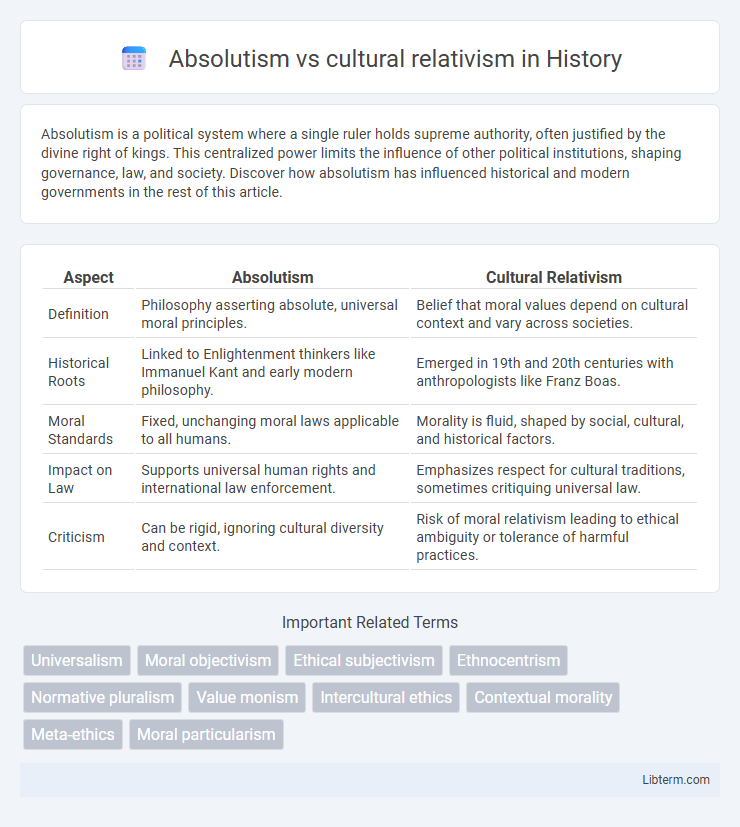Absolutism is a political system where a single ruler holds supreme authority, often justified by the divine right of kings. This centralized power limits the influence of other political institutions, shaping governance, law, and society. Discover how absolutism has influenced historical and modern governments in the rest of this article.
Table of Comparison
| Aspect | Absolutism | Cultural Relativism |
|---|---|---|
| Definition | Philosophy asserting absolute, universal moral principles. | Belief that moral values depend on cultural context and vary across societies. |
| Historical Roots | Linked to Enlightenment thinkers like Immanuel Kant and early modern philosophy. | Emerged in 19th and 20th centuries with anthropologists like Franz Boas. |
| Moral Standards | Fixed, unchanging moral laws applicable to all humans. | Morality is fluid, shaped by social, cultural, and historical factors. |
| Impact on Law | Supports universal human rights and international law enforcement. | Emphasizes respect for cultural traditions, sometimes critiquing universal law. |
| Criticism | Can be rigid, ignoring cultural diversity and context. | Risk of moral relativism leading to ethical ambiguity or tolerance of harmful practices. |
Defining Absolutism: Core Principles
Absolutism asserts that certain moral principles are universally valid and unchanging, regardless of cultural context. It emphasizes objective truths and fixed ethical standards that apply to all individuals and societies. Core principles include moral certainty, universal applicability, and the belief that some actions are inherently right or wrong.
Understanding Cultural Relativism
Cultural relativism emphasizes understanding beliefs, values, and practices within the context of a culture rather than judging them by external standards. This approach fosters empathy and reduces ethnocentrism by acknowledging that moral codes and social norms vary widely across societies. In contrast to absolutism, which asserts universal moral principles, cultural relativism promotes tolerance and respect for cultural diversity.
Historical Background of Both Philosophies
Absolutism, rooted in the Enlightenment era, emerged through philosophers like Immanuel Kant who emphasized universal moral laws applicable to all humans regardless of context. Cultural relativism developed primarily in the 20th century within anthropology, with figures such as Franz Boas advocating that moral values and ethical norms are shaped by cultural contexts and cannot be judged against universal standards. These contrasting philosophies reflect deep historical debates on whether ethical principles are fixed or variable across different societies and historical periods.
Moral Universality vs. Moral Diversity
Moral universality asserts that certain ethical principles apply to all humans regardless of culture, emphasizing consistent standards of right and wrong. Cultural relativism highlights moral diversity, arguing that ethical beliefs and practices are deeply embedded in cultural contexts and vary significantly across societies. The tension between these perspectives shapes debates on human rights, global justice, and ethical decision-making in multicultural environments.
Strengths and Weaknesses of Absolutism
Absolutism provides clear, universal moral standards that promote consistency and impartiality across different cultures and contexts, ensuring fairness in ethical decision-making. However, its rigidity often ignores cultural diversity and contextual nuances, leading to potential misunderstandings and conflicts when applied to multicultural societies. The inflexibility of absolutism may also suppress individual freedoms and impede adaptive responses to complex ethical dilemmas.
Pros and Cons of Cultural Relativism
Cultural relativism promotes understanding and tolerance by recognizing diverse moral practices as valid within their cultural contexts, reducing ethnocentric bias and fostering global empathy. However, it risks justifying harmful practices by denying universal ethical standards, potentially enabling human rights violations under the guise of cultural norms. Balancing respect for cultural differences with critical evaluation of actions remains a key challenge in applying cultural relativism effectively.
Absolutism in Contemporary Ethical Debates
Absolutism in contemporary ethical debates asserts that certain moral principles are universally valid regardless of cultural differences, providing a stable framework for evaluating actions across societies. This perspective challenges cultural relativism by emphasizing objective standards, such as human rights or justice, that transcend individual cultural norms. Absolutist views often shape international law and global ethics, influencing policies on issues like human trafficking, genocide, and freedom of expression.
Cultural Relativism and Globalization
Cultural relativism emphasizes understanding and respecting cultural differences without imposing external standards, which becomes increasingly significant in the context of globalization as diverse societies interact more frequently. Globalization accelerates cultural exchanges, making cultural relativism crucial for fostering mutual respect and avoiding ethnocentric judgments across borders. This perspective helps navigate ethical dilemmas and promote inclusive policies that accommodate varying cultural practices and values worldwide.
Case Studies: Absolutist vs. Relativist Approaches
Case studies illustrate the contrast between absolutist and relativist approaches by highlighting conflicts in human rights interpretations, such as female genital mutilation debated between universal human rights laws and cultural traditions in African communities. Absolutist perspectives demand uniform application of rights regardless of context, emphasizing inherent human dignity, while relativist approaches argue for respecting cultural differences and practices without imposing external values. These case studies reveal challenges in balancing global ethical standards with local customs, underscoring the need for nuanced policies that consider both universal principles and cultural specificity.
Finding Common Ground: Towards a Balanced Ethical Framework
Absolutism asserts universal moral principles applicable across all cultures, while cultural relativism emphasizes the context-specific nature of ethics rooted in cultural diversity. Finding common ground involves integrating universal human rights with respect for cultural practices to create a balanced ethical framework that promotes both global standards and cultural sensitivity. This approach encourages dialogue and mutual understanding, fostering ethical principles adaptable to diverse cultural contexts without compromising core human values.
Absolutism Infographic

 libterm.com
libterm.com